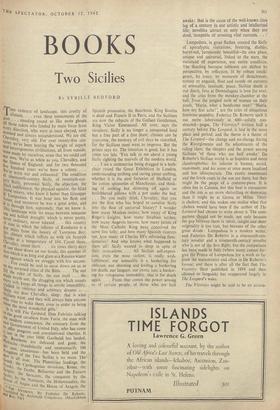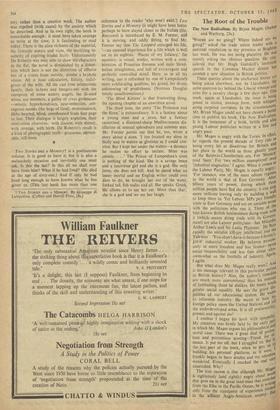BOOKS
Two Sicilies
BY SYBILLE BEDFORD HIS violence of landscape, this cruelty of Climate, . . . even these monuments of the Past • • . standing round us like mute ghosts, all those rulers who landed by main force from every direction, who were at once obeyed, soon detested and always misunderstood. We are old, Chevalley, very old. For over twenty-five cen- turies we've been bearing the weight of superb and heterogeneous civilisations, all from outside, none made by ourselves, none that we could call ur Own. We're as white as you, Chevalley, and re Queen of England; and for two thousand five hundred years we've been a colony. . . • Were worn out and exhausted.' The condition Of nineteenth-century Sicily, of twentieth-cen- 11,111rY Sicily, perennial Sicily, the abjection, the ck indifference, the physical squalor, the blind d/Oral misery, who knew it better than Giuseppe bj;`, LamPedusa. It was bred into his flesh and ones, and moreover he was a great artist; and is through him, supremely, that we know it. Chu landscape with 'no mean between sensuous /ag and hellish drought; which is never pretty, ''ever ordinary, never relaxed . . . this country r ours in which the inferno of Randazzo is a Miles from the beauty of Taormina Bay; Mill is climate which inflicts us with six feverish onths at a temperature of 104. Count them, o
evalley, count them . . six times thirty days _t sun sheer down on our heads; this summer of
curs „ Which is as long and glum as a Russian winter "'" against which we struggle with less success. „ • • Fire could be said to snow down on us as on the accursed cities of the Bible. . . . The sun lir] the ruler of Sicily, the sun itself . . . the vIde brash sun, the drugging sun which annuls crerY will, keeps all things in servile immobility, st:dled in violertce and arbitrary dreams. a . sic?, my dear Chevalley, sleep: that is what lans want, and they will always hate anyone the() trties
, to wake them, even in order to bring 11,n.ne most wonderful gifts.'
to the still The Leopard, Don Fabrizio talking the e good cavaliere from Turin. the man with ne„,111Wern conscience, the emissary from the to '~offGovernment of United Italy, who has come progress and constitutional liberties. It i8 lat er the eBoor the year 1860; Garibaldi has landed,
plebi bons are defeated and gone, the Per scite—fraudulently and unnecessarily 100
patcent. unanimous--has been held and the gu.cnn of the Two Sicilies is no more. The Greeks over. The Phoenician landings, the 4anks the Carthaginian invasions, Rome, the mpir tileth Goths, Belisarius and the Eastern e, e Irabs Saracens, the conquests by the House b the Normans, the Hohenstaufen, the of Anjou and the House of Aragon, the raosratedVbtcnaovs. By Federico De Roberto.
krid 30sY) Archibald Co _
Icohoun.• (MacGibbon Spanish possession, the Bourbons. King Bomba is dead and Francis II in Paris, and the Sicilians are now the subjects of the Gallant Gentleman, King Victor Emmanuel. All over, says the cavaliere; Sicily is no longer a conquered land but a free part of a free State; climate can be overcome, the memory of evil days be cancelled, for the Sicilians must want to improve. But the prince says no. The intention is good, but it has come too late. 'You talk to me about a young Sicily sighting the marvels of the modern world. . . . I see a centenarian being dragged in a bath- chair round the Great Exhibition in London, understanding nothing and caring about nothing, whether it is the steel factories of Sheffield or the cotton spinneries of Manchester, and think- ing of nothing but drowsing off again on beslobbered pillows with a pot under the bed. . . . Do you really think, Chevalley, that you are the first who has hoped to canalise Sicily into the flow of universal history? I wonder how many Moslem imams, how many of King Roger's knights, how many Swabian scribes, how many Angevin barons, how many jurists of the Most Catholic King have conceived the same fine folly; and how many Spanish viceroys too, how many of Charles III's reforming func- tionaries! And who knows what happened to them all! Sicily wanted to sleep in spite of their invocations. . . . All Sicilian self-expres- sion, even the most violent, is really wish- fulfilment; our sensuality is a hankering for oblivion, our shooting and knifing a hankering for death; our languor, our exotic ices, a hanker- ing for voluptuous immobility, that is for death again. . . . From that comes the power among us of certain people, of those who are half awake: that is the cause of the well-known time lag of a century in our artistic and intellectual life; novelties attract us only when they are dead, incapable of arousing vital currents. . .
Lampedusa, in great flashes, created the Sicily of apocalyptic visitations, festering, shabby, burnt-out, luminously beautiful—its own place, unique and universal, linked to the stars, the mainland of experience, our entire condition. The dazzling baroque tableaux are shifted by perspective, by reflection, lit by robust intelli- gence, by irony, by moments of detachment, ecstasy or anguish, float and recede on currents of sensuality, lassitude, peace. Sicilian death is our death, love at Donnafugata is love for ever, and the cries from the monkey-chamber at the ball, from the jungled mob of women on their poufs, 'Maria, what a handsome man!"Maria, how my feet ache!', are the cries of ubiquitous feminine stupidity. Federico De Roberto spelt it out more laboriously in 600—solidly con- structed—pages. The Viceroys,* written half a century before The Leopard, is laid in the same place and period, and the theme is a theme of The Leopard—the change and no-change during the Risorgimento and the adjustments of the ruling class; the sleepers and the power among Sicilians 'of those who are half awake.' De Roberto's Sicilian world is as hopeless and more claustrophobic; his inferno is human, social, man-made, and his scene at once more localised and less idiosyncratic. The exotic sweetmeats and the frock-coats in the sun are there, but they might be the props of a costume-piece. It is often hot in Catania, but this heat is extraneous and the sun is no more shrivelling or demoniac than it might be at Genoa or Milan. There is cholera; and this makes one realise what that cholera would have been if the author of The Leopard had chosen to write about it. The com- parison should not be made, not only because the gap between them in talent, insight and sheer originality is too vast, but because of the other great divide: Lampedusa is a modern writer, and Federico De Roberto is a nineteenth-cen- tury novelist and a nineteenth-century novelist who is not of the first flight; but the comparison has been made in Italy (where many cannot for- give the Prince of Lampedusa for a work so far from the mainstream) and often in De Roberto's favour, and there is after all the fact that The Viceroys (first published in 1894 and then allowed to languish) has reappeared largely in The Leopard's wake.
The Viceroys might be said to be an accusa- tory rather than a creative work. The author was repelled (with cause) by the society which he described. And in its own right, the book is remarkable enough: it must have taken courage to write at the time; it is fascinating to read today. There is the alien richness of the material, the fantastic nuriirs and vices, the terrifying in- sularity of expiring feudal Sicily. Unfortunately De Roberto was only able to show his characters in the flat, the novel is diminished by a distor- tion which here is not the distortion of afflatus but of a vision from outside, almost a keyhole vision. All is base calculation, fatuity, indul- gence of the wills. All the cast (one aristocratic family, their in-laws and hangers-on) with the exception of some watery angels, the ill-used wives, are monsters, a galley of crass grotesques —misers, hypochondriacs, near-imbeciles, out- rageous monks (the hogs of God), monomaniacs, filthy-hearted, blind, unredeemed from first page to last. Their dialogue is largely expletive, their motivation obsession: with disease, with money, with revenge, with birth. De Roberto's result is a kind of photographic truth—gruesome, memor- able, still-born.
Two Stories and a Memoryt is a posthumous volume. It is good to have it, but it is also a melancholy occasion and inevitably one must ask, Is this the last? Is this all we shall ever have from him? What if he had lived? (He died at the age of sixty-one.) And if only he had lived long enough to have known what he has given us. (This last book has more than one t Two STORIES AND A MEMORY. By Giuseppe di Lampcdusa. (Collins and Harvilt Press, 18s.) reference to the reader 'who won't exist.') Two Stories and a Memory (it might have been better perhaps to have stayed closer to the Italian title, Racconti) is introduced by E. M. Forster, and it is moving, and oddly fitting, to find Mr. Forster say that The Leopard enlarged his life, `—an unusual experience for a life which is well on in its eighties.' Places of my Infancy,' the memory, is visual, tender, written with a com- bination of Proustian fineness and male Stend- halian straightness, and full of extravagant and perfectly controlled detail. Here, as in all his writing, one is refreshed by one of Lampedusa's most exhilarating qualities, his grand, his divine unknowing of prudishness. (Norman Douglas totally unselfconscious.)
`The Blind Kittens' is that frustrating thing, the opening chapter of an unwritten novel.
The third item, the story 'The Professor and the Siren,' is extraordinary. It is a fantasy about a young man and a siren, but a fantasy cauterised, a diamond-sharp Mediterranean dis- tillation of sensual splendours and summer seas. Mr. Forster points out that he, too, wrote a story about a siren. 'I too located my siren in Sicily and in waters as glorious as I could con- trive. But I kept her under the waters—a decency he makes no effort to imitate. Mine was cosmic. . . .' The Prince of Lampedusa's siren is nothing of the kind. She is a savage beast and a lascivious girl and she is a god. She only loves, she does not kill. And he dared what no lesser mortal and no English writer could ever dare to do, he brought her out of the water, forked tail, fish scales and all. She speaks. Greek. He allows us to see her eat. More than that: she is a god and we see her laugh.







































 Previous page
Previous page